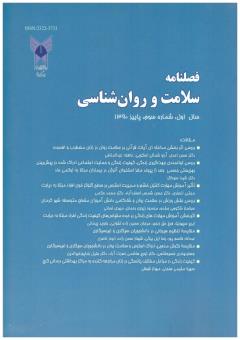بررسی نقش ورزش در سلامت روان و شادکامی دانش آموزان مقطع متوسطه شهر کرمان. نویسندگان : (سولماز شکوهی مقدم / محمود زیوری رحمان / مهدی لسانی)
محورهای موضوعی : روانشناسی حال خوب و بهزیستی روانشناختی
کلید واژه: ورزش, سلامت روان, شادکامی,
چکیده مقاله :
چکيده هدف از این تحقيق، بررسی رابطۀ ورزش با سلامت روان و شادکامی در بين دانش آموزان دختر و پسر مقطع متوسطۀ شهر کرمان بوده است. روش پژوهش، توصيفي به شيوۀ همبستگي است و نمونۀ مورد بررسي384 دانش آموز دختر و پسر هستند که به روش خوشه ای چند مرحله ای انتخاب شده اند، لطفاً جامعه آماری مشخص شود براي گردآوري اطلاعات از پرسش نامۀ 28 سؤالی سلامت روان (1979)، براي سنجش شادکامی از پرسش نامۀ 29 ماده ای شادکامی آکسفورد (1989) و برای تعیین نوع و میزان ورزش از پرسش نامۀ 15 سؤالی محقق ساخته استفاده شده است. اطلاعات با نرم افزار آماری SPSS 18 و با استفاده از آمار توصیفی، رگرسیون دومتغیره و چندمتغیره و تی تست تحلیل شد. نتایج بیانگر آن است که با اطمینان (01/0>p) بين ورزش و سلامت روان، ورزش و شادکامی و سلامت روان و شادکامی رابطۀ مثبت و معنا داري وجود دارد. همچنین از خرده مقیاس های سلامت روان، بین اضطراب و افسردگی با شادکامی (01/0>p) رابطۀ منفی و معنا¬داری وجود دارد، در حالی که بین کارکرد جسمانی و کارکرد اجتماعی با شادکامی رابطۀ معنا¬داري وجود ندارد. هم چنین نتایج حاکی از آن است که میزان ورزش و سلامت روان آزمودنی ها در دو گروه دختر و پسر تفاوت معناداری با هم دارد (05/0>p)، اما بین شادکامی دختران و پسران تفاوت معنا داری دیده نشد.
Abstract The purpose of the present was to investigate the relationship between sport and both male and female Kerman high school students mental health and happiness. The method of study is descriptive in a coefficient way. Besides, the studied samples have been choosen amang 384 male and female students by clustering them in several steps. The data gathering is conducted by using 28- item mental health questionnaire (GHO) while to analyze happiness a 29- item Axford happiness questionnaire (1989) and to determine the type and amount of sport a 15-item questionnaire of researcher are used. Information were analyzed by statistical software Spss 18 and using descriptive statistics, bivariate and multivariate regression and t-test. The results show there is a significant relationship between sport and mental health, sport and happiness, mental health and happiness (P 0.01). Also, according to small values of mental health, there is a significant relationship between depression, anxiety and happiness (P 0.01), while there is no significant relationship between physical function and social function and happiness. The results it is concluded that there is a significant relationship between the amount of doing (P 0.05), both male and female groups but no significant relationship between happiness in male and female students.

